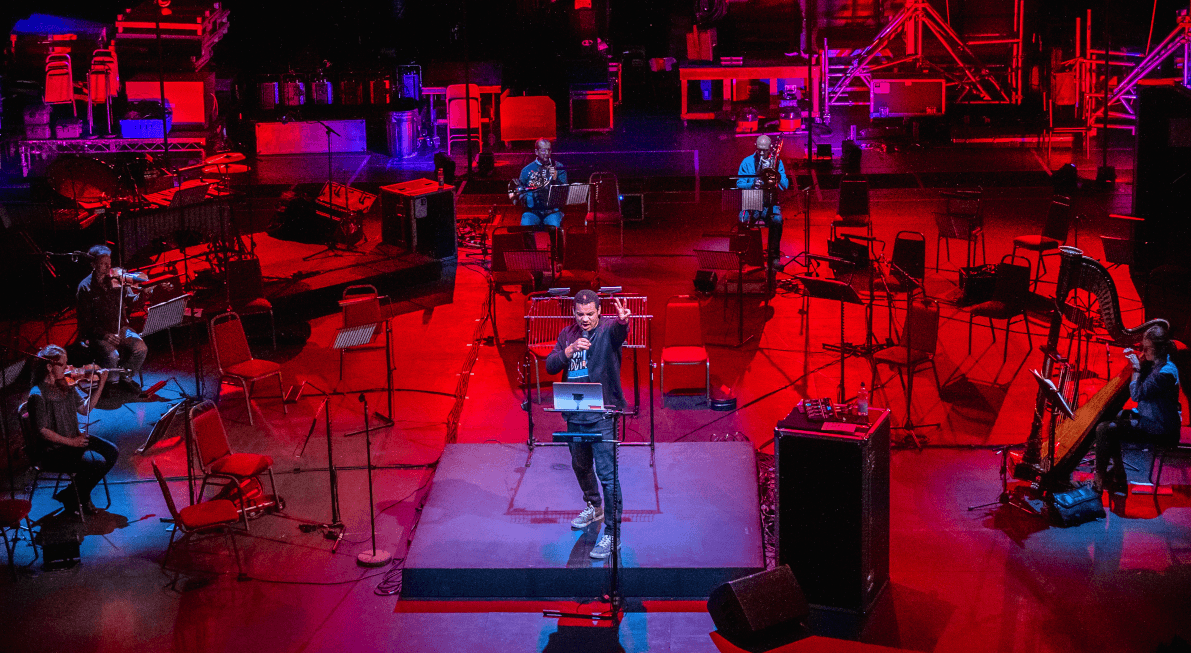
Testament in Orpheus at the Record Shop as part of Connecting Voices at Leeds Playhouse. Photo: Anthony Robling.
Outside Leeds Playhouse is a neon sign from the city’s 2019 Light Night; a defiant “I GET KNOCKED DOWN BUT I GET UP AGAIN”. Ignore the fact that Chumbawumba are from Lancashire and you may get misty eyed. The Playhouse is reopening with Connecting Voices, a programme of short works made in collaboration with Opera North.
Everything about being back in a theatre under safety measures reminds you of just what the safety measures are needed for, but it’s during the final instalment, Orpheus in the Record Shop, that I finally feel my shoulders relax for an hour of escapism. Beatboxer and spoken word performer Testament has rooted the story firmly in Leeds culture (the rounded walls of the Corn Exchange, taxis driving along Call Lane) and his love for the city shines through a genuine if a little unpolished performance (and honestly, with the state of my hair who am I to complain about a lack of finesse). The narrative feels all the more accessible for not fixing rigidly to its point of inspiration, the original myth of Orpheus and Eurydice. Instead, it touches on the myth’s central tone (heartbreak and loss) but doesn’t isolate those audience members who aren’t as familiar with the starting point.
The same cannot be said for Reflections on La Voix Humaine (3 October), a simultaneously independent and companion piece to La Voix Humaine (2-4, 9-17 October). Matthew Eberhardt directs the three elements of the piece. At the centre is an actress (Amy J Payne), questioning her silent lover. To the side, sitarist Jasdeep Singh Degun and Keertan Kaur perform classical Indian pieces. In the rafters, we have French chamber music. The three are physically distanced, their own islands within the seating (the audience are sat on the stage). This distancing unfortunately permeates the piece. We are offered some translation of the non-English lyrics but only in part, and whilst these centre around universal themes of loneliness, infatuation and desperation, it’s hard to find that reflected in part across Payne’s monologue. Her Actress feels over-the-top, a vaunting presence rather than the cowed person implied in the script; she barks lines about spaniel-like devotion to her lover Emile, stripping away the meek tone of her dialogue.
Aptly standing as outlier is Krapp’s Last Tape (2-17 October), more a cut and dry production than the other two shows. Niall Buggy lives Krapp fully, both in his curmudgeonly older age and in the smug satisfied thirty-nine year-old iteration we hear on the tape. There’s not so much introspection as retrospection, with Krapp consistently doing all he can to belittle and distance from those younger versions of himself. There’s an argument to be made for the relevance of Beckett’s play in lockdown, and under Dominic Hill’s direction, Krapp’s dingy desk space reflects a fair few makeshift workspaces in spare rooms. Buggy shuffles in his decidedly minimal radius, in such a way that instantly highlights a restriction on mobility. Whether it’s escapism to have the man cough with the full force of phlegm is another thing. The space certainly reflects that dank quality of Krapp’s living space and past-time (at one point a leak from the ceiling begins and drips a steady metronome for the remainder of the piece).
It’s satisfying to see Orpheus last in this programme of performances, as this is the show which offers the most hope at its conclusion. There’s no complete sense of closure to any of the pieces, yet Testament fills the climax of his script with resolutions. They’re everyday goals (call Dad, be nice to the security guard) but they’re nonetheless uplifting, offering a fresh life for a man who’s been through hell.
It feels ironic that for a thematic programme focussed on Connecting Voices, Orpheus is the only one which successfully achieves this. There’s no connection with his outside world for Krapp, rather an outright rejection of his past self. Similarly, Reflections whilst admirable, fails to fully unite its three isolated performances. Orpheus feels like the best representation of how we should be thinking of the arts right now, with funding limited if at all: not hampered by its source material, and offering genuinely engaging new writing which reflects the wide range of artists currently in need of support.
Connecting Voices runs at Leeds Playhouse until 17 October. More info here.

